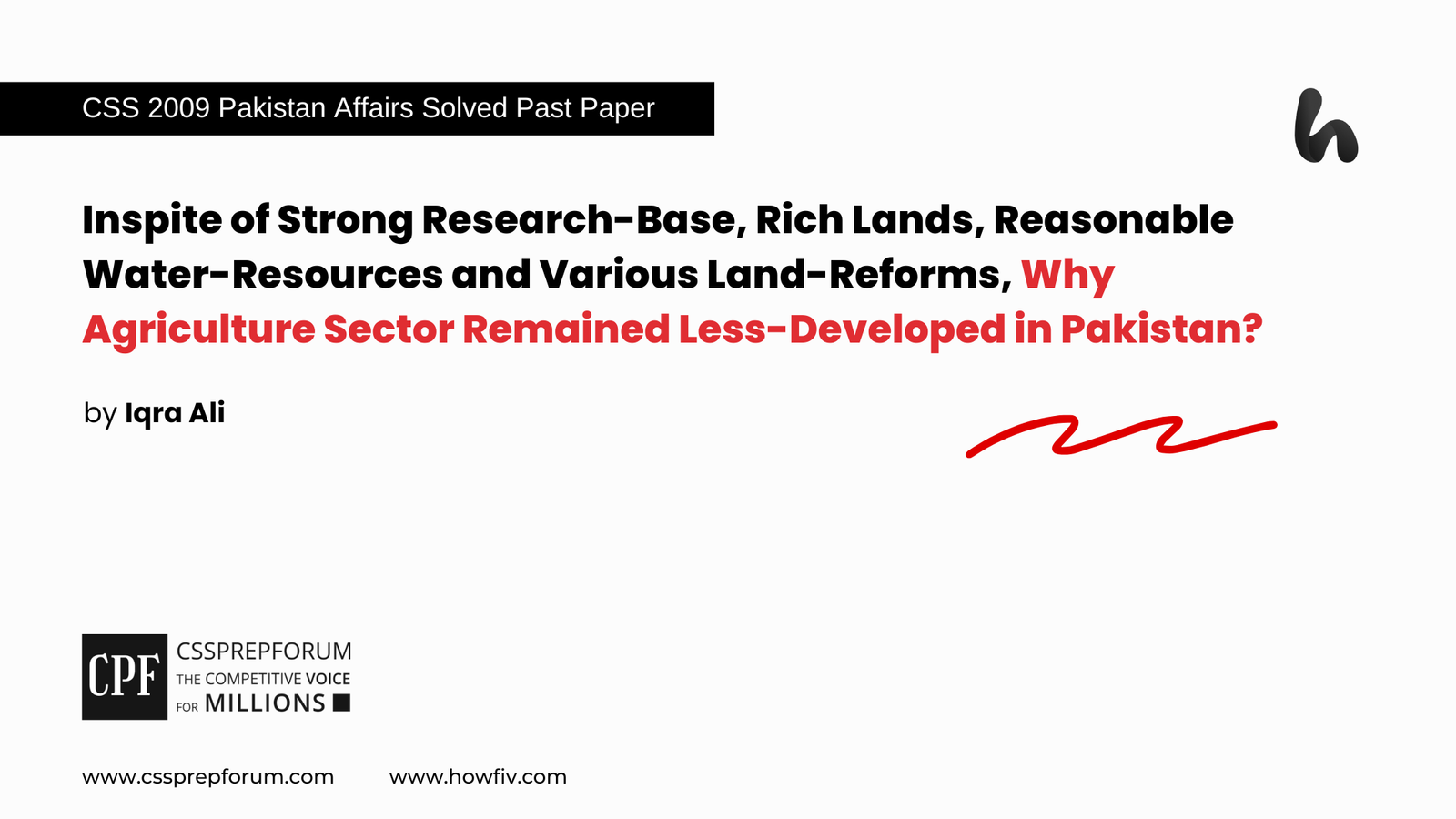CSS Solved Pakistan Affairs Past Papers 2023 | Pakistan is Located on the Cross-road of South Asia. Explain its Geostrategic/Political Importance and Challenges.
The following question of CSS Pakistan Affairs 2023 is solved by Sir Ali Imran, Pakistan’s Best Pakistan Affairs Coach, on the guided pattern of Sir Syed Kazim Ali, which he taught to his students, scoring the highest marks in compulsory subjects for years. This solved past paper question is uploaded to help aspirants understand how to crack a topic or question, how to write relevantly, what coherence is, and how to include and connect ideas, opinions, and suggestions to score the maximum.

Question Breakdown
The question demands a brief account of the geostrategic importance of Pakistan along with the exploration of multifaceted challenges that are in hindering the progression in Pakistan despite being a resource-rich country.
Outline
1- Introduction
2- Pakistan at the Crossroad of South Asia: A glimpse
3- Geostrategic importance of Pakistan in the region
4- Hurdles/Challenges in the way of a prosperous future for Pakistan
5- Synthesis
6- Conclusion

Answer to the Question
Introduction
Pakistan, located at the crossroads of South Asia, holds significant geostrategic and political importance in the region. Its strategic location, bordered by India to the east, Afghanistan and Iran to the west, China to the north, and the Arabian Sea to the south, has shaped its role in regional dynamics and global affairs. One of the key factors contributing to Pakistan’s geostrategic significance is its proximity to major energy-rich regions, such as the Middle East and Central Asia. The country serves as a crucial corridor for energy transportation, including oil and gas pipelines, connecting these resource-rich regions to the rest of the world. Additionally, Pakistan’s geographical position has made it an important player in regional security dynamics. It shares a complex relationship with neighbouring India, characterized by historical disputes, including the long-standing Kashmir conflict. The volatile border between the two countries has led to several conflicts and tensions, making Pakistan a focal point of regional security concerns. Similarly, border tensions regarding Afghanistan have also been a menace to the national integration of the country. With the amalgam of internal and external challenges along with the multifaceted glistening opportunities, Pakistan has a long way to adapt in the current circumstances. Striving for regional stability and managing regional conflicts, particularly concerning Afghanistan and India, remains a complex task for Pakistan’s foreign policy.
Pakistan at the Crossroad of South Asia: A Glimpse

Pakistan, located at the crossroads of South Asia, occupies a pivotal position that influences the regional dynamics of politics, trade, and security. Situated between the Middle East, Central Asia, and the Indian subcontinent, Pakistan’s strategic location provides both opportunities and challenges. One of the key factors contributing to Pakistan’s geostrategic importance is its proximity to energy-rich regions. The China-Pakistan Economic Corridor (CPEC) further enhances Pakistan’s geopolitical significance. In terms of regional security, Pakistan’s location presents both challenges and opportunities. Internally, Pakistan faces various challenges that impact its geostrategic position. Terrorism, sectarian violence, and separatist movements pose threats to internal security and stability. On the diplomatic front, Pakistan must navigate complex relationships with neighbouring countries and major powers. Balancing alliances and partnerships while safeguarding its national interests requires astute diplomacy. Pakistan’s engagement with the United States, China, Russia, and the Muslim world shapes its foreign policy decisions and has implications for regional dynamics.
Geostrategic importance of Pakistan in the region

Pakistan holds significant geostrategic importance in the South Asian region due to its unique geographical location and geopolitical factors. Here are some key points elaborating on its geostrategic importance:
- Strategic Location and Regional Power Balances:
Pakistan is situated at the crossroads of South Asia, Central Asia, and the Middle East. It shares borders with India, Afghanistan, Iran, and China, making it a vital link between these regions. Its location provides a gateway for trade, energy corridors, and transportation routes, giving it a strategic significance. Pakistan’s location plays a crucial role in the regional power dynamics. It borders India, with which it has had a complex relationship and a history of conflicts. As a nuclear-armed nation, Pakistan’s proximity to India contributes to the regional balance of power and has implications for regional security. Pakistan’s strategic location allows it to play a balancing role in the region, particularly in the context of the rivalry between India and China. Pakistan maintains a close relationship with China through economic and strategic partnerships, including the China-Pakistan Economic Corridor. This alliance provides Pakistan with economic benefits and serves as a counterbalance to India’s growing influence in the region.
- Access to the Arabian Sea:
Pakistan has a long coastline along the Arabian Sea, offering it access to vital sea routes. The deep-water port of Gwadar, developed in partnership with China, holds strategic importance for regional trade and energy transportation, particularly as part of the China-Pakistan Economic Corridor (CPEC) initiative.
- Influence in Afghanistan:
Pakistan shares a porous border with Afghanistan, and developments in Afghanistan have direct implications for Pakistan’s security and stability. Pakistan’s support or influence over various Afghan factions has been a significant factor in the Afghan conflict and peace processes, influencing regional dynamics. In this scenario, Pak Us relations have also remained a matter of concern as Pakistan has been a mediary and peace seeker during the whole Afghan peace deal and after the accomplishment of the deal, further challenges are awaiting to be addressed. Afghanistan in the current scenario has become a boiling point where peace is a necessity not only for Pak-Afghan relations but also for Pak-Us relations and to maintain regional stability especially when the Hindu supremacy is an uprising in the neighbouring borders of Pakistan vehemently. Meanwhile, the violence against human rights under the Taliban-led Afghanistan has raised further challenges which pose a threat to the region.
- Nuclear Capabilities:
Pakistan is the only Muslim-majority country possessing nuclear weapons. Its nuclear arsenal adds to its geostrategic importance by shaping regional deterrence dynamics and influencing regional security calculations. Pakistan’s possession of nuclear weapons adds to its geostrategic importance. As one of the few nuclear-armed countries in the region, Pakistan’s nuclear deterrence capability has a significant impact on regional stability and deterrence against potential aggression.
- Counterterrorism and Regional Stability:
Pakistan has faced significant challenges related to terrorism and extremism. Its efforts in combating terrorism and its cooperation with international partners have implications for regional stability, particularly concerning Afghanistan and the broader fight against terrorism. Pakistan’s proximity to Afghanistan presents both challenges and opportunities in terms of regional security. It has been a crucial partner in efforts to combat terrorism and stabilize Afghanistan. Pakistan’s support in facilitating peace talks and its influence over certain factions within Afghanistan positions it as a significant player in regional security dynamics.
- Energy Corridors:
Pakistan serves as a potential transit route for energy corridors, including oil and gas pipelines from the energy-rich regions of Central Asia and the Middle East. Such energy routes have the potential to enhance Pakistan’s economic prospects and regional influence. Pakistan’s geostrategic position also makes it a potential energy corridor. The country’s proximity to resource-rich regions, such as the Persian Gulf and Central Asia, positions it as a transit route for oil and gas pipelines. This not only enhances Pakistan’s energy security but also offers opportunities for revenue generation through transit fees and trade. Pakistan serves as a crucial land bridge connecting South Asia, Central Asia, and the Middle East. It lies at the crossroads of important trade routes, including the ancient Silk Road and the modern-day China-Pakistan Economic Corridor (CPEC). This positioning allows Pakistan to facilitate trade and transportation between these regions, enhancing regional connectivity and promoting economic integration.
- Muslim Ummah and OIC Membership:
Pakistan’s large Muslim population and its active involvement in the Organization of Islamic Cooperation (OIC) grant it influence in matters concerning the Muslim world. It allows Pakistan to advocate for Muslim causes, promote Islamic solidarity, and play a role in regional peace and conflict resolution initiatives.
- CPEC a Game changer:
On the accord of significant geostrategic location Pakistan has got the opportunity to be a part of CPEC( china Pakistan economic corridor) that encapsulates the multiple economic programs and energy projects. It is a flagship initiative of China’s Belt and Road Initiative (BRI) and aims to enhance connectivity between China’s western region and Pakistan’s Gwadar Port.CPEC encompasses various projects, including the construction of highways, railways, energy infrastructure, and industrial zones. It is expected to significantly boost Pakistan’s economy by improving transportation networks, attracting foreign investment, and creating employment opportunities. The corridor has the potential to transform Pakistan’s energy sector by addressing the country’s power shortages through the development of new power plants. It also aims to enhance regional trade and connectivity by providing a shorter and more efficient route for transporting goods between China, Pakistan, and other countries in the region.
While CPEC has the potential to bring economic benefits to Pakistan, there have been concerns regarding its long-term implications. Some critics argue that it may lead to a heavy debt burden for Pakistan and increase economic dependency on China. There are also environmental and social challenges that need to be addressed, such as the impact on local communities and ecological sustainability. Comprehensively, CPEC is a significant development project in Pakistan that holds both promise and challenges. Its successful implementation requires careful planning, transparent governance, and effective management to ensure sustainable economic growth and equitable benefits for all stakeholders.

Hurdles/Challenges in the way of a prosperous future of Pakistan
Pakistan’s geostrategic position presents both opportunities and challenges for its prosperous future. While being located at the crossroads of South Asia brings certain advantages, it also poses several hurdles that need to be overcome.

- Regional Instability:
Pakistan shares borders with Afghanistan, Iran, India, and China, all of which are significant regional players. The volatile security situation in Afghanistan and the longstanding tensions with India have a direct impact on Pakistan’s stability and development. Ongoing conflicts and regional rivalries can hinder economic growth, impede trade, and divert resources away from development initiatives.
- Terrorism and Extremism:
Pakistan has faced persistent challenges from terrorism and extremism, which have had a detrimental impact on its stability and economic progress. The presence of militant groups and their cross-border activities pose security risks and deter foreign investment. Addressing these challenges requires robust counter-terrorism measures, promoting social cohesion, and countering extremist ideologies.
- Energy Security:
Pakistan faces energy security issues, relying heavily on imported oil and gas. This dependency makes it vulnerable to fluctuations in global energy prices, affecting economic stability. Diversifying the energy mix, investing in renewable energy sources, and exploring regional cooperation on energy projects is essential to overcoming this challenge.
- Water Stress:
Pakistan is highly dependent on its rivers for agriculture and water supply. However, the country faces water stress due to climate change, population growth, and inefficient water management practices. Water scarcity affects agricultural productivity, food security, and industrial development. Sustainable water management strategies, including reservoir construction, water conservation, and efficient irrigation techniques, are crucial for addressing this challenge.
- Trade and Connectivity:
Pakistan’s geostrategic position offers opportunities for regional trade and connectivity. However, political tensions, border disputes, and inadequate infrastructure pose obstacles to realizing this potential fully. Enhancing transport infrastructure, resolving territorial disputes through diplomatic channels, and promoting regional cooperation frameworks such as the China-Pakistan Economic Corridor (CPEC) can help overcome these challenges.
- Balancing Relations with Major Powers:
Pakistan’s strategic location has attracted the attention of major global powers, including the United States, China, and Russia. Balancing relations with these powers while safeguarding national interests can be challenging. Navigating geopolitical rivalries and ensuring mutually beneficial partnerships require careful diplomacy and strategic decision-making.
- Economic Inequalities:
Pakistan struggles with significant socio-economic inequalities, including regional disparities and income gaps. Unequal distribution of resources and limited access to basic services hinder inclusive development. Focusing on equitable economic policies, investing in human capital, and promoting social welfare programs are crucial for addressing these inequalities.
- Regional Security Dynamics:
Pakistan’s proximity to conflict-prone regions, particularly Afghanistan, poses security challenges. The prolonged conflict in Afghanistan has resulted in cross-border militancy, refugee influx, and the smuggling of illicit goods and weapons. Instability in neighbouring regions affects Pakistan’s security environment, making it imperative to enhance border management, intelligence sharing, and counter-terrorism cooperation with neighbouring countries.
- Indo-Pak Relations:
The long-standing disputes and unresolved issues between Pakistan and India, particularly regarding Kashmir, have strained bilateral relations. The tense relationship has a direct impact on regional stability and hinders economic cooperation and trade opportunities. Resolving these disputes through diplomatic means and confidence-building measures is crucial for creating an environment conducive to regional prosperity.
- Nuclear Deterrence:
Pakistan’s possession of nuclear weapons introduces an additional layer of complexity to its geostrategic dynamics. While nuclear deterrence provides a sense of security, it also entails the responsibility of maintaining a robust command and control structure, preventing nuclear proliferation, and managing potential escalation risks. Effective nuclear diplomacy and adherence to non-proliferation norms are essential for maintaining stability in the region.
- Economic Dependency:
Pakistan’s economic growth is dependent on foreign aid and assistance, which can restrict its autonomy in decision-making and development planning. Economic dependency hampers self-sufficiency and can lead to vulnerabilities in times of geopolitical shifts or changes in aid policies. Pakistan must focus on diversifying its economy, promoting domestic industries, and attracting foreign direct investment to reduce its reliance on external assistance.
- Water Disputes:
Pakistan faces water-related challenges due to its dependence on the Indus River system and its distribution among riparian states. Water disputes with India and concerns over upstream water diversion by neighbouring countries pose significant challenges to water security. Effective water diplomacy, bilateral and regional agreements, and the development of water management infrastructure are necessary to ensure equitable access to water resources.
- Regional Rivalries:
The geostrategic position of Pakistan places it amid regional rivalries, including those between India and China and Saudi Arabia and Iran. Navigating these rivalries and maintaining a balanced approach to foreign policy is critical for Pakistan’s stability and regional cooperation. It requires skilful diplomacy, fostering economic partnerships with multiple countries, and playing a constructive role in mediating conflicts.
- Internal Governance and Corruption:
Ensuring effective governance, transparency, and accountability remains a significant challenge for Pakistan. Corruption, political instability, and weak institutions hinder sustainable development efforts and erode public trust. Strengthening democratic institutions, promoting good governance, and tackling corruption are crucial for fostering an enabling environment for prosperity.
- Climate Change and Environmental Degradation:
Pakistan is vulnerable to the adverse impacts of climate change, including extreme weather events, melting glaciers, and sea-level rise. These environmental challenges affect agriculture, food security, and livelihoods, exacerbating socio-economic disparities. Developing and implementing climate change adaptation strategies, promoting renewable energy sources, and adopting sustainable practices is vital for mitigating the adverse effects of climate change.
Addressing these challenges requires a multifaceted approach that combines effective governance, regional cooperation, sustainable development practices, and proactive diplomacy. By leveraging its geostrategic position effectively and overcoming these hurdles, Pakistan can unlock its potential as a prosperous and stable nation in the region.
Synthesis
Pakistan’s geostrategic position at the crossroads of South Asia holds both importance and challenges for the nation. Its location makes it a crucial player in regional dynamics and a gateway to Central Asia, the Middle East, and the Indian Ocean. This geostrategic significance brings both opportunities and complexities to Pakistan’s political landscape.
In terms of importance, Pakistan’s location offers strategic access to key trade routes, such as the Arabian Sea and the Strait of Hormuz. It serves as a vital corridor for regional connectivity, energy transportation, and trade between South Asia, Central Asia, and the Gulf countries. Moreover, its proximity to Afghanistan places it at the forefront of efforts to stabilize the war-torn country and combat cross-border militancy. However, this geostrategic significance also presents challenges. Pakistan faces security concerns due to its volatile neighbours, particularly Afghanistan, where instability, terrorism, and the Afghan conflict spill over into its territory. Tensions with India, primarily over the Kashmir dispute, pose another challenge, impacting regional stability and hindering economic cooperation.
Pakistan’s possession of nuclear weapons adds another layer of complexity. While it provides a deterrent against potential aggression, it necessitates responsible management, adherence to non-proliferation norms, and effective nuclear diplomacy to maintain stability in the region. Economic challenges arise from Pakistan’s dependency on foreign aid and assistance, limiting its autonomy in decision-making and development planning. Diversifying the economy, attracting foreign investment, and reducing reliance on external assistance are crucial steps to achieve sustainable growth. Water disputes, particularly with India and concerns over upstream water diversion, also pose significant challenges to Pakistan’s water security. Addressing these disputes through effective water diplomacy, bilateral agreements, and water management infrastructure is essential for equitable access to water resources.
Furthermore, Pakistan must navigate regional rivalries, such as the tensions between India and China and Saudi Arabia and Iran, while maintaining a balanced foreign policy approach. Skilful diplomacy, economic partnerships, and constructive conflict mediation can help mitigate these challenges. Internal governance, corruption, and weak institutions hinder Pakistan’s progress. Strengthening democratic institutions, promoting good governance, and tackling corruption are vital for sustainable development and public trust. Lastly, Pakistan is vulnerable to climate change impacts, which affect agriculture, food security, and livelihoods. Developing climate change adaptation strategies and adopting sustainable practices is critical for mitigating these challenges.
Essentially, Pakistan’s geostrategic position brings both opportunities and challenges. By effectively addressing security concerns, resolving regional disputes, strengthening governance, promoting economic diversification, and prioritizing climate change mitigation, Pakistan can harness its geostrategic importance to foster regional cooperation and achieve a prosperous future.
Conclusion
The Crux of the matter is that Pakistan’s location at the crossroads of South Asia bestows upon it significant geostrategic and political importance. Its proximity to energy-rich regions, such as the Middle East and Central Asia, positions it as a vital corridor for energy transportation and trade. The country’s strategic port of Gwadar, along with the China-Pakistan Economic Corridor, strengthens its connectivity and economic ties with China and the Arabian Sea. Pakistan’s geographical position also shapes its role in regional security dynamics. Its tense relationship with India, stemming from historical disputes like the Kashmir conflict, makes it a focal point for regional security concerns. Furthermore, its border with Afghanistan presents challenges in terms of terrorism, cross-border militancy, and refugee issues.
Being a nuclear-armed nation, Pakistan’s nuclear capabilities add to its influence in regional and global security matters. Its nuclear deterrence strategy plays a crucial role in maintaining strategic stability in the region. However, managing these capabilities and navigating the complex web of international relations present diplomatic challenges for Pakistan. Despite its geostrategic importance, Pakistan faces various challenges. Internal security concerns, including terrorism, separatist movements, and sectarian violence, pose significant threats to its stability and development. Economic challenges, such as poverty, unemployment, and inadequate infrastructure, hinder the country’s progress. Moreover, Pakistan must deftly manage its relationships with neighbouring countries and major powers, balancing alliances and partnerships while safeguarding its national interests
CSS 2023 Solved Pakistan Affairs
CSS Solved Past Papers’ Essays
Looking for the last ten years of CSS and PMS Solved Essays and want to know how Sir Kazim’s students write and score the highest marks in the essays’ papers? Then, click on the CSS Solved Essays to start reading them.
CSS Solved Essays
CSS Solved General Science & Ability Past Papers
Want to read the last ten years’ General Science & Ability Solved Past Papers to learn how to attempt them and to score high? Let’s click on the link below to read them all freely. All past papers have been solved by Pakistan’s top CSS GSA coach having the highest score of their students.
General Science & Ability Solved Past Papers












